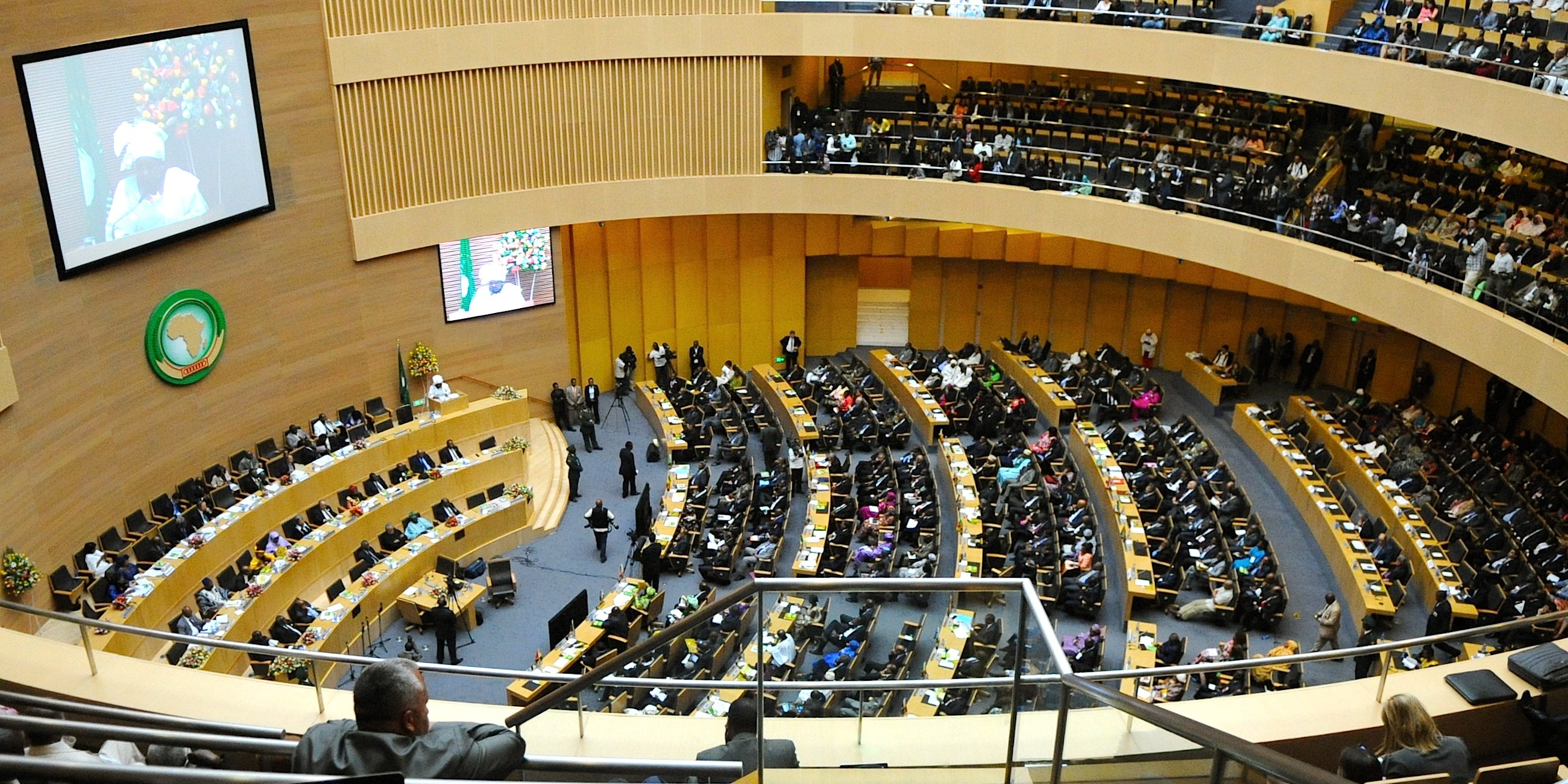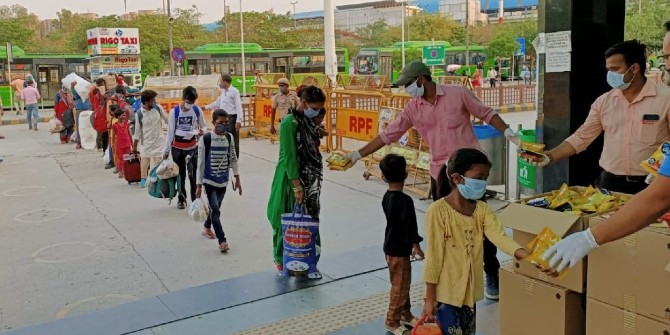COVID-19 has disrupted the delivery of essential public services, including social services that benefit the most vulnerable individuals in our society. The provision of these services and the safety nets that complement them vary across countries. Regardless of which income group they fall under, both rich economies and emerging economies are experiencing the dual challenge of simultaneously confronting both a public health crisis and a public finance crisis, write Tanyah Hameed and Clare FitzGerald (University of Oxford).
The COVID-19 situation in low- and middle-income countries (LMICs) is compounded by additional problems. Access to healthcare in these countries is often still dependent on the ability to pay, either formally or informally. Healthcare systems are generally weak with poor public health surveillance and constrained by public provision which is often inadequate, unreliable and of low quality. Also, weak tax bases, mismanagement of public finances, and emphasis on competing expenditures (such as defence) have provided little opportunity to strengthen social safety nets. Only one in five of the poorest individuals are covered by social safety nets in low-income countries. State support for people who face homelessness, substance abuse, recidivism and have care needs is therefore far behind what welfare-oriented states in western and northern Europe can offer. These problems leave LMICs badly prepared to counter a pandemic. New adaptation responses are also trickier to implement. Densely populated slums have offered limited ability to distance socially. In some countries like Pakistan, the bulk of all non-agriculture employment is based in the informal sector, which does not naturally lend itself to economic support packages being implemented by federal governments. There are also fears that the current focus on COVID-19 may have long term secondary health impacts on child mortality and vaccination due to shifting public health priorities and delayed access.
Delivering impact bonds in uncertainty
How are emerging approaches to delivering public services faring in this new world of uncertainty? How do they compare to more traditional models such as grants and fee-for-service? At the GO Lab, we are particularly interested in understanding effective cross-sector partnerships through innovative models such as outcomes-based commissioning and impact bonds (IBs). Generally, IBs involve at least a tripartite relationship between an outcome funder, who defines the outcomes and expresses willingness to pay for them; a service provider, who delivers the social intervention; and an investor, who covers the upfront costs of the intervention to make a risk-adjusted return via payment from the outcomes funder if desired outcomes are achieved. There are currently 188 impact bonds around the world, 16 of which are based in lower- and middle-income countries.
Unable to deliver in-person services, impact bonds are finding it hard to offer the customised and intensive support they are known for. Travel restrictions have had an immediate effect on operations. In some healthcare projects, patients are reluctant to come back for crucial follow-ups. Data collection and verification processes, which lie at the heart of an outcomes contract, are disrupted due to limited client contact. While many have switched to virtual support and remote outcomes verification, this is not possible in all cases. There are additional requests for frontline staff to have more personal protective equipment (PPE), particularly in health-related projects. Their training and professional development need to be rethought. More recently, the GO Lab has been exploring if the purported advantages of IBs can help projects adapt to COVID-19 through our Emergency Responses and Government Outcomes (ERGO) peer learning group. Conversations with our partners closer to the frontline have revealed three main ways in which impact bonds have proved helpful at this time, particularly in LMICs: shared understanding of success among stakeholders, adaptive delivery, and blended finance.
Shared understanding of success among stakeholders
The development process which these projects go through necessitates stakeholders to collaborate closely over long periods, and to develop a shared appreciation of impact and alignment of incentives. Development timelines of two or three years are typical, requiring diverse stakeholders to work together and meet much more frequently than they would traditionally. This has proved to be instrumental in building consensus among stakeholders around COVID-19 response. Furthermore, stakeholders can combine their expertise and think outside of the box when contemplating solutions, in ways that may not be possible in other types of projects.
In most projects, the focus, therefore, has been on continuing service delivery for their service users and stabilising cash flows to facilitate this. Commissioners and outcome payers have supported this actively and demonstrated a willingness to work in new ways. High trust between partners has enabled creative adaptation, despite the limited ability for data verification and accountability. Social Finance, an intermediary in this space, have seen this manifest across all the projects they are involved in. In the UK, projects within the Life Chances Fund (an outcomes fund supported by UK central government) have been given the option to choose between pausing services, continuing their agreed outcomes contract, or adopting a grant arrangement based on revised project plans. Many projects have shown a desire to continue operating on an outcomes basis while they negotiate with outcomes payers on extending timeframes or contract values to compensate for COVID-19’s disruption and additional delivery costs. In India, years of stability meant that providers found themselves less prepared than those in some other countries. But being part of a strong collaborative network has helped the Quality Education India DIB (Development Impact Bond) bring in virtual training and capacity building for their providers from experienced professionals with relevant experience at Brookings. This level of prompt access may not have been possible for some of these providers in the absence of this network. In Argentina, the frequency of payments has been increased from quarterly to monthly, to support cash flows.
While impact bonds bring together stakeholders from different sectors and establish new ways of working, this multitude of actors can also slow down decisions during emergency responses. This is because a wide range of actors- investors, providers, outcome payers- need to give their consent before decisions can be made. However British Asian Trust, conveners of the outcomes fund involving the Quality Education India DIB, contend that these added considerations and perspectives can also lead to higher quality decisions which favour more sustainable and long term solutions.

Adaptive delivery
Impact bonds are provider-centred and employ flexible contracts which allow adaptive delivery. Many use a ‘black box approach’ which enables providers to choose the intervention or service they think is best and adapt it to the evolving needs of their service users (instead of having these prescribed by government or outcome payers). Inputs are not presumed. Projects have therefore had the contractual and legal space to rethink services and prioritise accordingly while shifting to virtual formats at short notice.
In Cameroon, a project on neonatal health has implemented telephone follow up calls after discharge, to provide additional mental health support for mothers. IBs geared towards employment and training, such as Finance for Jobs in the West, face particular challenges in placing their participants in the current economic circumstances. However, due to the flexibility of the service delivery method and availability of the right providers, they have also been able to reorient their focus towards new needs in local economies. The Finance for Jobs project is now hoping to equip nurses with soft and hard skills and to offer them internships which can lead to employment. They are also introducing a new programme which will allow doctors to pass licensing exams, and begin practising in hospitals. A similar programme is also being developed for individuals providing at-home care. Some of the provision has also been shifted to a later point, to provide more coverage at later stages of the response. In India, a new impact bond due to launch in September aims to train individuals for roles within healthcare services (technicians, hospital managers) and logistics.
In Argentina, impact bonds were already adapting to economic turbulence in the country by using more of an employability focus. The onset of COVID-19 has helped them shift focus on areas of increased demand such as entry-level staff for shops, supermarkets, pharmacies, logistics and transport. Meanwhile, the Quality Education India DIB is looking at a range of options to resume educational services once lockdown ends, such as staggered classes, using WhatsApp, and accommodating for limited access to technology. The flexibility these projects have been able to employ is often not possible in more traditionally commissioned projects, where shifting of focus from originally specified services could mean losing money.
On the other hand, impact bonds also bring their own challenges which can hamper adaptation to the pandemic. LMICs typically have less technological infrastructure that their counterparts in Europe and the US have been able to rely on during their shift to virtual services. The Quality Education India DIB has faced considerable disruption due to the strict lockdown imposed in India, where many of the children have moved back to villages with their parents who were migrant labour in cities. While mobile phone penetration is high in South Asia, this does not mean that these phones are smartphones equipped with the necessary technology or indeed that all children even have access to the families’ limited devices. Such pre-crisis conditions may, therefore, counter the flexibility of the impact bond model. Those who are closest to the realities of these projects may not be the ones making the adaptation decisions and might over-estimate adaptation possibilities. Nevertheless, some argue that impact bonds in LMICs have been keener to stick to outcomes contracts than their UK counterparts as they are more experienced in crisis response and have developed resilient procurement and contracting procedures as a result.
The stage at which an impact bond also has consequences. For projects that are still in their initial stages of delivery (such as the Finance for Jobs project in the West Bank), pausing or adapting is much easier. There are less ‘sunk costs’ involved and projects can reorient their services more easily, as their providers have yet to incur payments and there is still an opportunity to use the initial investment. It would also be incorrect to assume that all impact bonds have the contractual definition and measurable outcomes required to implement the above adaptation. Those paid on fixed-rate cards or outcome validation through impact evaluations many years down the line might find this much more arduous.
Blended finance
The private finance and social impact investment element of IBs (blended with government and donor finance) has helped cash strapped LMIC governments to not only expand their social services but also to think of more long-term solutions in the COVID-19 context. Many of these social services are either absent or insufficient and while impact bonds are not able to cover the entirety of these populations, they have certainly galvanised action, helped successful providers scale their work and set helpful precedents around cross-sector collaboration and efficient data systems. By helping most of these services continue at this time, where needs are further exacerbated by COVID-19, this private finance has helped impact bonds support some of the most vulnerable individuals who may not have had equivalent support from strained public services. Despite the disruption, employment-focused impact bond in Argentina reports performing at a 35% success rate, which is still three times the success rate of comparable government-run employment programmes in the country.
Conversely, some investors may be more commercially minded than others and find a scenario of no returns far less palatable than others. In cases where impact bonds adapt to an activity basis, it is worth asking if the risk is still being undertaken by investors. If not, should outcome payers still pay them returns above costs?
Three improvements for the future
The above discussion reveals that impact bonds face their own challenges while adapting to COVID-19. These challenges point to the need for three main aspects to be improved upon in the future.
- Firstly, impact bonds in LMICs need to consider building technological infrastructure that could be instrumental for providers and service users both in times of emergency and otherwise.
- Secondly, contingency planning and crisis adaptation need to be thought through more carefully. A range of circumstances can disrupt services and leave service users in distress, both nationally and internationally. Learnings from the successes and failures of COVID-19 adaptation need to be actively documented and fed into future project design. Is there a case for more adaptive providers to be rewarded in the future and for others to be penalised?
- Thirdly, contracts need to be designed with more in-built resilience, including more robust governance mechanisms. In volatile environments, there are advantages to using diverse outcome payers instead of just the government. Where rate cards apply, plans for how those might be loosened given a changing context could prove valuable when disaster strikes. In the future, could we accept the possibility of overpaying to cut down the time spent fine-tuning contracts, in return for the added benefits of collaboration and transparency? Could a ‘quicker and dirtier’ version of these contracts capture core values but bypass the challenges being encountered around the speed of response?
Impact bonds for intermediate response and recovery
While impact bonds may not be suitable in the immediate response phase, they may well have an important role to play in the intermediate response and recovery phase. There is value in the underlying principles that bring these projects and their stakeholders together, such as cross-sector collaboration, robust data systems, high transparency and impact-focused funding. A post-Coronavirus world is likely to be one of increased needs across all areas of social services, but with traditional public services both exhausted and even more cash-strapped after the current emergency response. All funders are cutting down on funding and rechannelling it to essential areas. In this world, impact bonds could play an integral part through their flexible contracts, innovative delivery and blended sources of finance. Particular attention will be needed in areas such as nutrition and food security, education disruption and its long-term effects on children, and employment training- some of which are areas where impact bonds are already gaining useful experience across a range of contexts. Most importantly, the core capabilities developed as part of implementing impact bonds will be crucial in shouldering the imminent recovery and reconstruction phase.
This post represents the views of the authors and not those of the COVID-19 blog or LSE. Image: United States government work.






Such an important area as the world tries to build back better. My challenge would be how to minimise the overhead cost and time associated with IB set up, and secondly how sustainability is addressed, if and when the bond is repaid. The work done by the Robertson Trust in developing an alternative model, Social Bridging Finance, is well worth a look as it addresses these very issues.